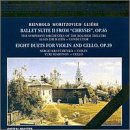| All Artists: Gliere, Kravchenko, Semionov Title: Ballet Suite 2 Chrysis Op 65 Members Wishing: 0 Total Copies: 0 Label: Icone Release Date: 10/13/1998 Genre: Classical Styles: Ballets & Dances, Ballets, Chamber Music Number of Discs: 1 SwapaCD Credits: 1 UPC: 601053000926 |
Search - Gliere, Kravchenko, Semionov :: Ballet Suite 2 Chrysis Op 65
 | Gliere, Kravchenko, Semionov Ballet Suite 2 Chrysis Op 65 Genre: Classical
|
Larger Image |
CD Details |
CD ReviewsA welcoming issue. David A. Hollingsworth | Washington, DC USA | 02/25/2000 (5 out of 5 stars) "Reinhold Moritzovich Gliere (1875-1956) was a post-Tchaikovskian, Ukrainian born eminent composer of Soviet Russia (also an important and influential pedagogue of the Conservatories of Moscow and Kiev-his most important student was Boris Lyatoshynsky). Until his death, his musical idioms never quite abandoned the Russian Romanticism Glazunov was the last to cherish until his demise in 1936. Gliere's music therefore remained beautiful and accessible, easy to the ears, and tuneful, if not euphonious. On the debit side, however, his ideas lost its creative spark and its immediate appeal from the 1940s onwards and Gliere never quite recaptured the imaginative magic and dynamicism that made the epic Ilya Murometz (Third Symphony of 1911) and his 1927 ballet Red Poppy such masterpieces. But Gliere's contribution was significant and longlasting and as a recepient of six USSR State awards, Gliere understandably was the most honoured of Soviet composers (until Lev Knipper, who won seven). The ten movement suite from the ballet-pantomine "Chrysis" (written after the Red Poppy) contains flows of fine, imaginative, & poetical ideas. The movement "Dreams" is especially memorable and tuneful and there's sometime magical in "At the Brook" and Intermezzo sections. Gliere's ideas were slavic in character and lyrical, not far from the Scriabinian mysticism found in Rimsky-Korsakov's later scores or from the noble, melancholic expressions of Rachmaninov. The same could be said regarding the Eight Duets for Violin and Cello (1911). The work is perhaps more eccentric than his later scores while the lyricism and freshness remained intact throughout. Gliere's sense of picturesque colorism is as profound here as in his works in post 1917 Russia. The performances were done with a good sense of intimacy and involvement. I especially admire the performance of the suite by Zhuraitis and the Bolshoi Theater Orchestra, with the strings of real bloom and weight. Sergei Kravchenko (violin) and Yuri Senionov (cello) played the Eight Duets with good persuasiveness. The recording is impressively well-balanced and accurate. However, my only reservation is that because this CD is only 56 minutes in total duration, another work or two of Gliere could have been included. The Eight Duets have been exuberently well performed by the South African Chamber Music Society under the masterfully recorded Koch Discover International CD.Reservation aside, this CD is recommendable."
|

 Track Listings (18) - Disc #1
Track Listings (18) - Disc #1